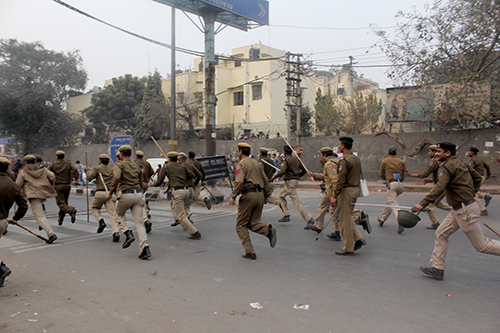As police cracked down on protesters in Delhi during recent protests over the treatment of Dalits, who occupy the lowest rungs of India’s caste ladder, journalists were caught in the fray. The protests were sparked by the suicide of Rohith Vemula, a student who had been barred from halls of residence and parts of campus, according to news reports.
CPJ has previously documented cases of police and security forces using harsh measures and jailings to suppress media coverage across the country, from the restive regions of Kashmir and Chhattisgarh to the capital, Delhi. This latest case raises the question again of how such misconduct–often unchecked–is able to continue in a country that claims the mantle of being the world’s largest democracy.
Photojournalist Rahul M., who was covering one of the protests in Delhi on January 30, for the independent magazine The Caravan, says police beat him and broke his camera. In an interview with CPJ, Rahul, who goes by only one name, described the assault and shared pictures of the protest that he managed to take before his equipment was smashed.
This interview has been edited for clarity.
CPJ: Please tell us about events leading up to your assault.
Rahul: Vemula belonged to the same region in south-eastern India I am from. As such, I had been following the media fallout of his death. Back home, local news channels probed leaders of the Akhil Bharatiya Vidyarthi Parishad (ABVP), a right-wing student organization, to see if they had played a role in Vemula’s death. [Editor’s note: The student group and government officials were accused of pressuring Vemula’s university to take punitive measures against him. They have denied any wrongdoing, according to reports.]
In the wake of his suicide, an umbrella organization of various left-wing student groups announced a call to protest. I was covering a protest outside the Delhi headquarters of the Rashtriya Swayamsevak Sangh, the right-wing parent organization of the ABVP, for The Caravan.
I reached the protest late and started trailing other journalists, photographing and gathering information. I saw police charging at students. In fact, I remember pushing the shutter button, and capturing the police running at protesters when I heard the charge orders. The police started rounding up and beating the students toward the back of the protest. Many of the policemen I saw responding violently did not wear name-badges. A few minutes before the police aggression began, I asked some of the policemen why they were not wearing name-badges, to which they did not reply. I told them that I was a journalist, and that was why I was asking questions.
The police also turned a blind eye to young men in plainclothes–unclear at the moment who they were–beating up the students.
[Editor’s note: The Delhi Commissioner of Police, Bhim Sain Bassi, did not immediately respond to CPJ’s request for comment on allegations of police brutality against students and journalists, or allegations against officers Rahul names in this interview.]
« Previous Image | Next Image »
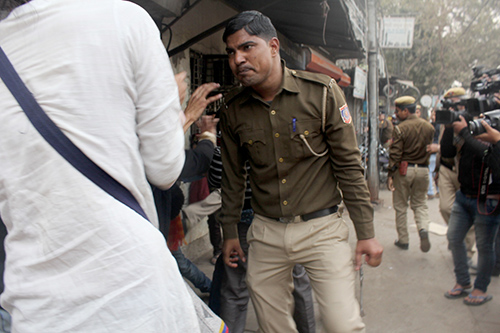
Rahul’s coverage of the rally includes images of uniformed police breaking up protesters. (Rahul M.)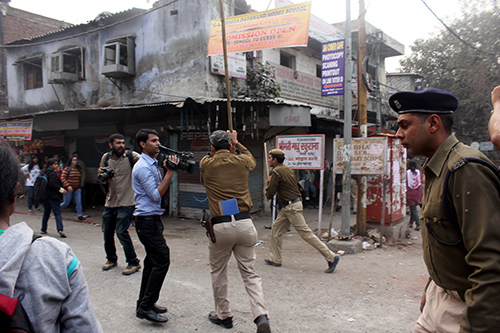
A policeman raises his lathi (baton) as he approaches a cameraman and protesters in Delhi. (Rahul M.)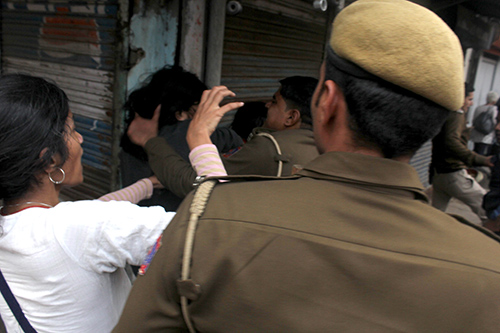
Delhi police say they are investigating claims officers were heavy handed at the protest. (Rahul M)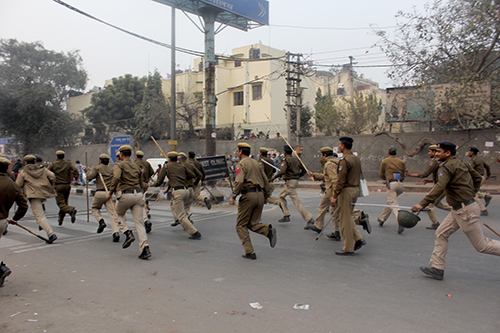
Police in Delhi charge at protesters. Rahul says he was beaten shortly after hearing the order to charge. (Rahul M.)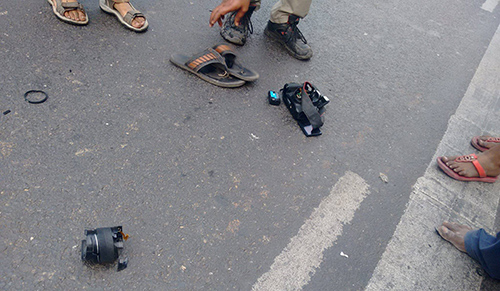
Rahul was able to salvage his memory card after his camera was smashed, above. (Priyanka Sharma)
CPJ: Can you describe the attack against you?
Rahul: I was shooting pictures of policemen and men in plainclothes attacking students, which was when a few policemen surrounded me and a sub-inspector, whose first name on the nametag read Dinesh, grabbed my camera by its flip-LCD screen and smashed it to the ground despite my telling him that I was a journalist. Other journalists have photos of him just before he attacked me and also of him breaking my camera. His superior officer, whose name-badge read Sagar Singh Kalsi, was present at the spot when I was being attacked. By this time, constables had rounded me up and were charging at me, despite my repeatedly informing them that I was only doing my job as a journalist. I kept telling them I am a journalist but they kept beating me. Whenever I tried to go toward my broken camera to take it, they pushed lathis [batons] into my stomach.
I managed to get hold of my broken camera, and the first thing I did was to remove the memory card. As I was doing this, a female student argued with the police that I was a journalist and they cannot beat me. I immediately gave my camera, without the memory card, to her and told her my name and asked her keep the camera [for me.] The camera’s 18-55mm lens is broken to bits, the battery space is damaged. My phone was also damaged.
After receiving the blows and abandoning my camera, I immediately rushed to The Caravan‘s office to speak with editors about what happened, and discuss the story. Then I went back to my room, took painkillers, filed my story and went to sleep. Next day, I went to a hospital to seek medical treatment, and record what had happened.
CPJ: What has the police response been to these allegations?
Rahul: The police initially denied they used force. Now they have said they are investigating the matter.
CPJ: Has this attack affected your outlook on press freedom in India?
Rahul: Exercising press freedom, I think, is about going beyond the press releases and the stories the powerful want the public to believe in, to achieve transparency in the systems that govern us. As journalists we tend to take up assignments that our editors give us or from events that we find exciting, or file reports that are everyday affairs. I think freedom of press exists beyond these, in the way stories are followed, pursued, and taken to their logical end, in spite of all hurdles, and in an ethical way.
Journalists should be allowed to work freely as they keep democracies accountable. But a government’s hostility to press shouldn’t deter journalists from doing their jobs. The fact that my camera is broken shouldn’t deter me from doing what my job is. Only cameras can be broken, not the photographs. Mine is a tragedy at a personal level, and important information could have been lost had I not taken the memory card out and written down what I saw.
The lesson from the incident is a personal one: be more careful. And, maybe, use the lens wildlife photographers use the next time I have to cover any protest outside the RSS office.
CPJ: We have long documented cases of police brutality against journalists in India and elsewhere, including here in the U.S. What changes do you think are necessary to prevent further cases of journalists being attacked or harassed by authorities in India?
Rahul: I think there need to be reforms in the police department. The police, in India at least, feel entitled to beat and harass people, including journalists. During the course of my reporting on an earlier story, I learned that police usually refuse to register First Information Reports, or complaints, in cases where police officers have assaulted protesters, even when there are records to prove injuries and eyewitnesses who can identify the perpetrating officers. If these victims demand action or accountability against such officers, they are threatened with counter-legal cases under non-bailable offences. So, in some sense, the laws that are meant to protect the public–especially victims of violence–are strategically used by the police to protect themselves and further victimize those already suffering. Moreover, the Indian Police Act, which governs the police in India, introduced by the British during colonial rule to curb movements that sought independence from the British rule, is antiquated and needs updating.
